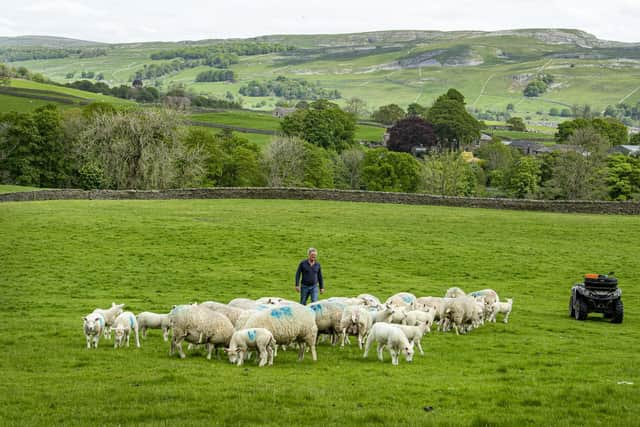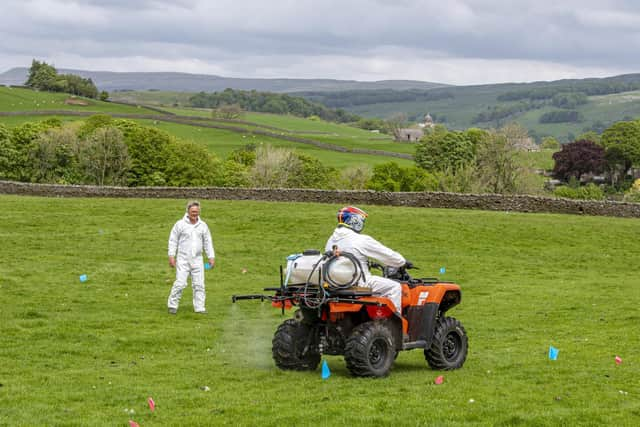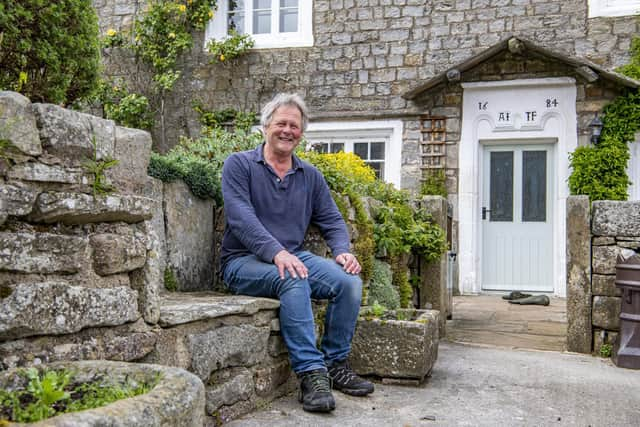Farm of the Week: Former accountant now trains Dales hill farmers in pesticide use
John Bownass of Field Gate Farm in Giggleswick has a flock of 120 Lleyn ewes and a newer flock of what will grow to be 50 Herdwick ewes next year, which he has taken from starting with two ‘Herdies’ in just three years. It was six years ago that a training course he attended on the other side of the training fence led to the involvement he now has in delivering courses for others.
John said that his new career works well alongside the farm and that the combination of farming and training, that he conducts from Field Gate as part of the Settle-based training company Lowe Maintenance, is something he finds invigorating.
Advertisement
Hide AdAdvertisement
Hide Ad“I love it and it dovetails in quite nicely with the farm as we now deliver courses direct from here. It’s a big thing standing in front of people and training them on things like knapsack spraying, boom spraying, weed wiping and ATV training.


“The idea of becoming a trainer happened by default. I’d been trained by Demelza Lowe on the safe use of pesticide and had subsequently attended a few more courses. I became good friends with Demelza and her husband Phil and just happened to mention one day that they could have a brilliant ATV course using the farm.
“Demelza asked if I fancied sitting in on some spraying courses to see how she delivered them and to look at becoming an instructor. It’s something I’d never done before but now I’m teaching people from right up in Fraserburgh to the south coast.”
John’s grandfather Tom Bownass purchased Field Gate Farm in 1946 but it had a sitting tenant until 1995. John moved to the farm with his then young family in 1996 having previously had a smallholding in the village of Hellifield where he grew up.


Advertisement
Hide AdAdvertisement
Hide AdJohn said the move to the traditional Dales livestock farm running to 140 acres saw him take on Lleyn sheep in 1998.
“I was a freelance accountant for a number of years, known as a briefcase and wellies accountant, but I retired from that a while ago now.
“I’d originally brought stock from the smallholding I’d had but I’d taken a leaf out of a neighbour’s book with the Lleyns. He had bought some the year before I got them and looking over the fence I’d been impressed with how easy they were to farm and how well they seemed to grow.
“I decided I’d take some on and went to the major Lleyn Sheep Society sale in Carlisle and purchased a pen of shearling ewes and a pen of ewe lambs. I then acquired a ram and set about farming them.


Advertisement
Hide AdAdvertisement
Hide Ad“The flock now runs to 120 pedigree Lleyn breeding ewes. They’re not MV registered but they are pure. I don’t keep any of the ram lambs and I don’t sell any of them for breeding, but I do sell the shearling ewes for breeding and have a good market for them, selling through Skipton livestock market and usually attracting a good price.”
John said what he likes about the breed is that he can breed his own flock replacements and that he is now exploring their potential further by crossing them. “They have good frames, they are excellent ewes and I run a closed flock apart from buying the occasional ram, which gives me a high health status.
“I buy big rams, the big round fleshy type that breed good carcase lambs which I can sell at good weights in Bentham livestock market.”
Three years ago John’s daughter Annie gave birth to his first grandchild Elsie. John said he attended Skipton’s Rare Breeds Sale the day after Elsie was born and bought two Herdwick ewes, with a view to them being for her.
Advertisement
Hide AdAdvertisement
Hide Ad“I bought them from well-known Herdwick breeder Ian Grisedale and when I got them home suddenly thought about what I was going to do with just two.
“I contacted Ian asking whether he had some more I could buy and he invited me over to take a look. I bought another ten from him and then picked up another half dozen from Chris Ryder of Blubberhouses’ dispersal sale at Skipton. I now had a new flock. I went back to Ian to get a ram and I was under way.”
John said he learned quickly that ‘Herdies’ were quite a different sheep species. “Everything you ever thought you knew about sheep, forget when it comes to them. They are in a totally different world and the best thing you can do is let them get on with it.
“But they are great clean grazers and they love grazing what other sheep won’t.
Advertisement
Hide AdAdvertisement
Hide Ad“River banks and hill sides of dubious quality they love, not for them the lush grasses. They’ve really cleaned up parts of my farm.
“They will look after each other and will sit quite contentedly in a circle at the top of a hill. They lamb outside. I’ve lambed 32 ewes this time and I have another 18 to come into this year’s breeding flock in autumn.”
John said his grandfather was a livestock grader at the old Hellifield livestock market and that his father Arthur was a livestock dealer buying calves from local livestock markets and selling to abattoirs around Leeds and Bradford.
“I remember taking lambs into Hellifield, which closed decades ago. It was quite a thriving market where between 4,000-5,000 lambs would be sold every Thursday before it was sold for building land. When I go to Bentham livestock market these days it reminds me of how Hellifield used to be.”
Advertisement
Hide AdAdvertisement
Hide AdJohn said he is enjoying what he considers a perfect combination of his sheep farm and the training courses.
“Explaining figures and tax was something I’d done all my life until the training side came along and my work with figures has helped.
“There is an element of maths to pesticide spraying in that the ethos of the knapsack spraying is about safely calibrating the mix of water and pesticide.”
